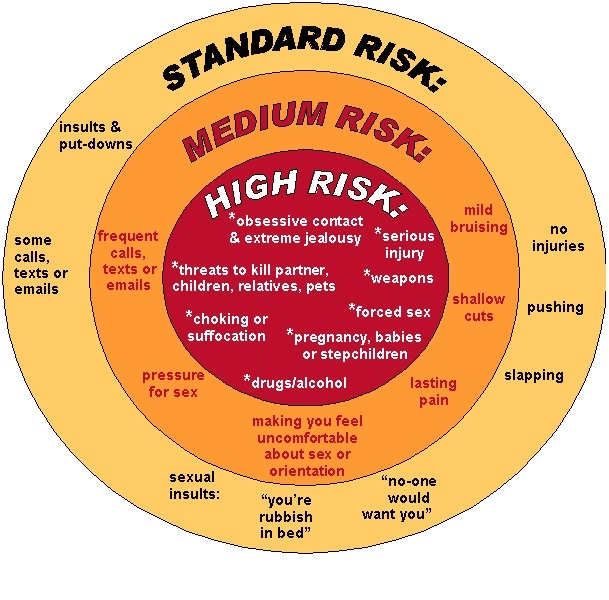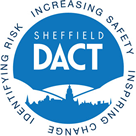Am I in Danger?
All domestic abuse is damaging, but in some cases it can be very dangerous.
If you are very frightened of your partner (or other family member), take it seriously. Ring the Sheffield Domestic Abuse Helpline on 0808 808 2241 to talk through your situation with people who can help you to work out whether you are in danger.
We know from research into serious cases of domestic abuse that some factors make the risk of serious harm much higher. Women in particular are much more likely to experience serious injury, psychological damage and repeat victimisation from domestic abuse. The image below shows some indicators of standard, medium and high risk.
 Signs of High Risk
Signs of High Risk
Some high risk factors are listed below. If you can tick several of these high risk factors, you could be at high risk of serious harm. Ring the Sheffield Domestic Abuse Helpline to talk about your risk and your options:
Are you:
- very frightened about what your partner (or family) might do to you or other people in your family? You know your partner (or family) best and how they behave and you could be the best judge of how much danger you are in.
- planning to leave your partner/family or have you recently left? Separation from a violent partner can be a dangerous time.
- pregnant or do you have a baby or step-children. Abuse often gets worse during pregnancy and after birth, and research shows increased risk in households with babies under 18 months. The presence of step-children also increases the risk to both women and children in violent relationships.
- feeling isolated? Does your partner control who you see? Do you have no friends or family nearby and are you too scared to get medical help or in touch with services?Or is English not your first language?
- feeling depressed or suicidal? Do you feel powerless to change your situation? Recognising you are being abused is an important first step and ringing for advice and support can make all the difference.
- dependent on your partner/family financially or for physical care? Do your circumstances keep you within your abuser’s control?
Has your partner (or family member):
- started to abuse you more often and more severely? Are attacks happening more frequently and more seriously each time?Domestic violence is most likely to happen if it has happened before. It usually gets worse and rarely gets better.
- injured you before? Have you got medical help or reported incidents to the police?
- tried to choke, strangle, suffocate or drown you? Have you ever lost consciousness? Such attacks are very dangerous and can easily end in death.
- threatened to kill you, children, relatives or pets? Does your abuser have a history of carrying out threats and do you believe they could?
- sexually assaulted you (or children) in your home? Does your partner force you to have sex, deliberate hurt you during sex, force you to have sex with others (possibly for money).
- constantly harassed you with texts, calls and emails? Checking up on you obsessively? Does your partner follow you or get others to check up on you?
- used weapons or objects to hurt you? Does your abuser have access to weapons or military/martial arts training?
- got a drugs or alcohol habit? Drugs and alcohol reduce self-control and can make violence more severe.
- ever threatened or attempted suicide? If the abuser feels that they have nothing to live for, then they might not worry about the fallout of their actions.
If you are living with high-risk domestic abuse, it can be very hard to understand what is happening, and who is responsible. If you feel confused and scared, ring the helpline for specialist advice. Speaking to someone can help share that burden. It can help you to make sense of it all and find out what your options are.



